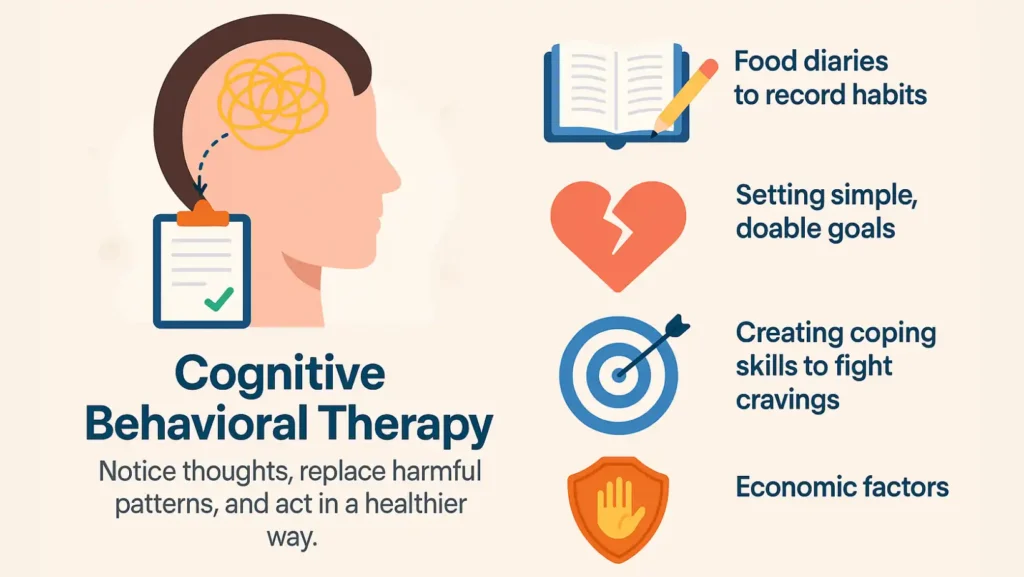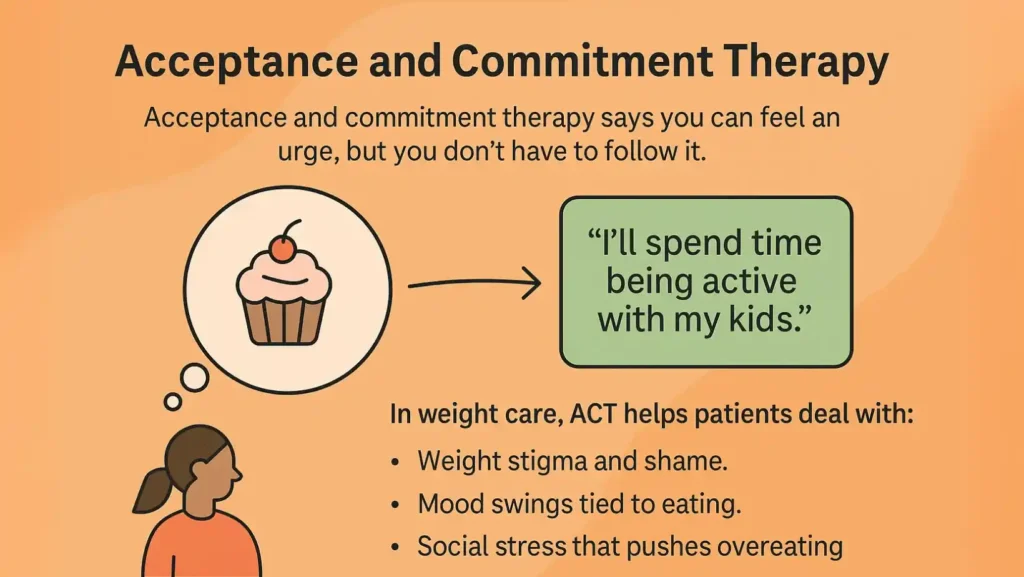Obesity therapy is not just about losing weight. It is about changing health, mind, and daily life. Many people think of diets as the only option, but therapy offers more.
Table of Contents
ToggleToday, medical experts use a mix of talk therapy, lifestyle change, and drug therapy for obesity to help patients. Each therapy type has strengths. Choosing the right one depends on your goals, health, and habits.
Cognitive Behavioral Therapy (CBT) For Obesity

Cognitive behavioral therapy is the most studied talk therapy for weight problems. It works by showing you how thoughts affect actions. If you eat when stressed, CBT helps you spot this and change your response.
Cognitive behavioral therapy is a method that teaches you to notice thoughts, replace harmful patterns, and act in a healthier way. Instead of “I failed my diet, so I’ll binge,” CBT helps reframe this into “I had one extra snack, I can get back on track now.”
CBT sessions often last 12 to 20 weeks. They include:
- Food diaries to record habits.
- Identifying emotional triggers.
- Setting simple, doable goals.
- Creating coping skills to fight cravings.
Example: A patient who eats fast food daily after work may use CBT to pause, reflect on stress, and instead take a short walk or pick a healthier snack. Over time, this builds a new habit.
CBT also supports self-esteem. Many people living with obesity carry guilt or shame. By tackling negative thought cycles, CBT improves confidence and lowers risk of relapse.
Acceptance And Commitment Therapy (ACT) For Weight Management

Acceptance and commitment therapy is different from CBT. It does not focus on stopping negative thoughts. Instead, it teaches you to accept them and act based on your values.
Acceptance and commitment therapy says you can feel an urge, but you don’t have to follow it. If you crave sweets late at night, ACT helps you notice the thought without reacting. Then you choose an action aligned with your health goals.
In weight care, ACT helps patients deal with:
- Weight stigma and shame.
- Mood swings tied to eating.
- Social stress that pushes overeating.
For example, if a person values family time, ACT helps them commit to being active with kids rather than spending evenings in front of the TV. This approach links weight care to meaningful goals.
ACT is not about perfection. It is about long-term behavior built on values. This can make weight management more sustainable than quick diets.
Intensive Behavioral Therapy (IBT) For Obesity
Intensive behavioral therapy is a structured program delivered in clinics. It involves frequent, short counseling sessions. Under Medicare, patients with BMI ≥ 30 can get IBT covered in primary care.
IBT follows a stepwise plan:
- Weekly visits in the first month.
- Biweekly visits for months two to six.
- Monthly visits for maintenance up to a year.
This format ensures constant support, checks progress, and adjusts goals. IBT sessions cover diet and exercise programs, food logs, relapse prevention, and stress management.
IBT works best for people who need close monitoring and medical supervision. Evidence shows that regular contact improves patient adherence. A person who attends IBT often achieves greater weight loss compared to self-directed dieting.
Interpersonal Therapy (IPT) In Obesity Treatment
Interpersonal therapy looks at how relationships and social factors affect weight. People often eat in response to conflict, loneliness, or loss. IPT helps identify these links and build healthier patterns.
Interpersonal therapy is a short-term talk therapy that focuses on improving social skills and resolving personal issues. By managing relationship stress, eating triggers reduce.
For example, a patient who overeats after fights with a partner can use IPT to develop healthier coping responses, like communication or a walk. Studies show IPT works well for those with disordered eating behaviors, such as binge eating.
IPT also helps with body image struggles. People learn to balance self-acceptance with healthy change. This makes IPT especially useful when social stress is a main trigger for obesity.
Lifestyle Interventions For Obesity Management
Lifestyle interventions for obesity remain the foundation of treatment. They involve simple daily changes in food, activity, and sleep.
Key parts include:
- A structured diet that lowers calorie intake but still provides nutrients.
- Regular physical activity, often starting with walking or light exercise.
- Tracking progress with logs or apps.
- Setting realistic goals like losing 5 to 10% of body weight over six months.
These interventions also reduce obesity-related health risks such as diabetes, heart disease, and high blood pressure. They lead to metabolic health improvement when followed under medical guidance.
For many, lifestyle care is the first line of treatment for obesity. Doctors often combine it with therapy or medication for better results.
Drug Options: Drug Therapy For Obesity
When lifestyle care alone is not enough, doctors may add drug therapy for obesity. Several FDA-approved medicines help with weight loss.
Examples include:
- Orlistat: blocks fat absorption.
- Phentermine-topiramate: reduces appetite.
- Naltrexone-bupropion: works on brain reward circuits.
- Liraglutide and semaglutide: mimic gut hormones that cut hunger.
- Tirzepatide: a newer option showing large weight drops.
These drugs often produce 5–20% weight loss when combined with therapy. However, they need medical support because side effects may occur, like nausea or digestive problems.
Doctors recommend medicines for patients with BMI ≥ 30, or BMI ≥ 27 with chronic health conditions such as diabetes or high blood pressure.
Drug therapy for obesity is most effective when paired with behavioral care, not as a stand-alone fix.
Obesity Management Programs And Support
Obesity management programs bring together all tools—behavioral therapy, medicines, nutrition, and exercise. These programs often use multidisciplinary obesity care with doctors, dietitians, and psychologists working together.
A good program offers:
- Psychological support for obesity such as CBT or IPT.
- Nutritional support with structured diet planning.
- Medical supervision for safe use of drugs.
- Long-term follow-up to prevent relapse.
Many programs also address weight stigma, which often stops patients from seeking help. By focusing on holistic care, these programs improve outcomes beyond weight loss, including chronic disease prevention.
How Can I Tell If Therapy Is Right For Me?
You may need therapy if:
- Diets and exercise plans fail to last.
- Emotions often lead to overeating.
- You live with stress, anxiety, or depression.
- You face medical risks tied to weight.
A simple consultation with a doctor or therapist can confirm the right option. Therapy is also key if you struggle with body image or disordered eating behaviors.
Finding A Supportive Therapist For Obesity Treatment
Finding the right therapist matters. Look for someone trained in CBT (Cognitive Behavioral Therapy), ACT (Acceptance and Commitment Therapy), IBT (Intensive Behavioral Therapy), or IPT (Interpersonal Therapy).
Ask these questions:
- Do they have experience in obesity therapy?
- Do they provide medical support if needed?
- Do they work as part of an obesity management program?
- Do they respect your pace and avoid weight stigma?
A supportive therapist not only guides weight loss but also strengthens mental health and self-esteem.
The Bottom Line
There is no single cure for obesity. A mix of therapies often works best. Obesity therapy can mean talk therapy, lifestyle changes, or drug therapy for obesity. The right path depends on your health, triggers, and goals.
Therapy improves more than numbers on a scale. It cuts health conditions, builds confidence, and protects the heart. With the right support, weight loss becomes steady and sustainable.
FAQs
What is behavioral therapy for obesity?
Behavioral therapy teaches skills to change eating habits, handle stress, and stay active. It helps with daily choices that affect weight and long-term health.
What drugs are used to treat obesity?
Common drugs include orlistat, semaglutide, tirzepatide, and phentermine-topiramate. These medicines lower appetite or reduce fat absorption and require doctor supervision.
What is the best therapy for obesity?
The best therapy depends on the person. Most experts suggest a mix of lifestyle change, therapy, and medication for safe and lasting weight control.
What is behavioural support for obesity prescribing?
This is counseling given when a doctor prescribes weight-loss medicine. It improves adherence, reduces side effects, and ensures drugs are used with safe lifestyle changes.
What are the 5 as for obesity counseling?
They are: Assess, Advise, Agree, Assist, and Arrange. These steps guide doctors in offering structured, respectful, and effective weight care to patients.
What is the first line of treatment for obesity?
Lifestyle change is the first step. Doctors recommend balanced diets, exercise, and behavior therapy before adding medicines or surgery to a patient’s plan.
What kind of drugs treat obesity?
Drugs include appetite suppressants, hormone-based drugs like GLP-1 agonists, and fat-blockers. They help reduce hunger, improve metabolism, and aid long-term weight loss.

This article is medically reviewed by Dr. Chandril Chugh, Board-Certified Neurologist, providing expert insights and reliable health information.
Dr. Chandril Chugh is a U.S.-trained neurologist with over a decade of experience. Known for his compassionate care, he specializes in treating neurological conditions such as migraines, epilepsy, and Parkinson’s disease. Dr. Chugh is highly regarded for his patient-centered approach and dedication to providing personalized care.










